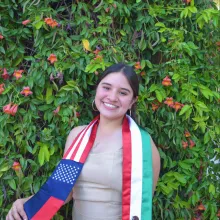PLAN FOR SUCCESS WITH COMPETITIVE SCHOLARSHIPS
Jennifer Gaxiola reflects on her experience applying for, and sometimes winning, nationally competitive scholarships

Jennifer Gaxiola (above) spent three weeks in Switzerland, an opportunity afforded to her by receiving the Gilman Scholarship.
Receiving a scholarship can have a huge impact on your college trajectory.
It can lead you to explore new places and areas of study that might have otherwise not been possible due to finances and allow you to gain access to pivotal experiences. The process of applying for scholarships can be very simple. Some of our internal scholarships only require you to answer three questions! But it can also be rigorous, requiring applicants to jump through a series of hoops, including essays, interviews, and sometimes tests.
With competitive scholarships, there can be multiple rounds of such requirements. Luckily, the Office of Nationally Competitive Scholarships is located within the Franke Honors College, and is dedicated to connecting students with opportunities that match their goals and mentoring them through the application process.
Persistence Pays Off
Jennifer Gaxiola is a senior at the University of Arizona, expecting to graduate at the end of the spring 2023 semester. Gaxiola is triple majoring in Political Science, Spanish & Portuguese, and Global Studies. On top of her studies, she also works for the University of Arizona bookstore and interns at the Mexican Consulate in Tucson.
Funding has always been a foundational component of Gaxiola’s academic life, as it is for many students. According to the Education Data Initiative, over 1.7 million scholarships are awarded annually. However, only 7% of college students will receive a scholarship.

Gaxiola visited many notable landmarks while studying abroad.
In her pursuit of academic funding, Gaxiola was awarded a Gilman Scholarship. With this scholarship, she was able to study abroad in Switzerland for three weeks and got to visit International Organizations such as the United Nations, World Bank, and European Parliament.
After receiving the Gilman Scholarship, Gaxiola set her sights on the Pickering Fellowship. She spent a month fine tuning her application materials, working closely with the Office of Nationally Competitive Scholarships and, after submitting everything, was elated to find out that she had been chosen as a finalist.
“I want to be a diplomat in the future, and so the [Pickering] fit my goals exactly,” said Gaxiola. “But you have to start your application with the mindset that you might not get it—it’s a 50/50 opportunity.”
There is a reason nationally competitive scholarships are characterized as competitive. "For the Pickering Fellowship, only 45 students are awarded the scholarship out of a national pool. The application process involves an essay and a final interview. After advancing through the first round, Gaxiola was not selected for the Fellowship.
“My best piece of advice is to prepare and come up with a script for the interview, and always keep in mind that you’re applying for a government job and that your skills and knowledge matter. Write everything down, and practice, practice, practice,” said Gaxiola, “ONCS helped me by setting up mock interviews with really important people at the University.”

Gaxiola will be graduating from the W.A. Franke Honors College in Spring 2023.
Even though she was not chosen for the Pickering Fellowship, Gaxiola has remained optimistic and reflective throughout the entire process. She is currently applying for more competitive scholarships—the Samvid Scholarship, Fulbright and possibly Pickering again.
"It’s important to try again and not give up just because it doesn’t work out the first time around,” reflected Gaxiola.
Gaxiola talks candidly about her experience applying for scholarships. She’s realistic about it, but not to a fault. She understands the nature of applying for a competitive scholarship, but doesn’t let the odds dissuade her from working hard, continuing to fine tuning her application, and hitting submit.
Here is her advice for students who are thinking about beginning the process themselves:
-
Talk to your advisor. It can be easy to feel discouraged or like you’re not good enough. Sometimes it’s helpful to get a different perspective and seek out encouragement from those who know you and your potential.
-
Get to know yourself. Everyone has their own set of skills, and everyone has something of value to bring to the table.
-
Consider not only what you can bring, but what you can learn.
-
Talk to other scholarship winners. Their stories can be inspirational and helpful to understanding the application process.
-
Talk to ONCS. ONCS has so many helpful resources for students who are looking for funding opportunities.
Have you considered applying for a nationally competitive scholarship?

